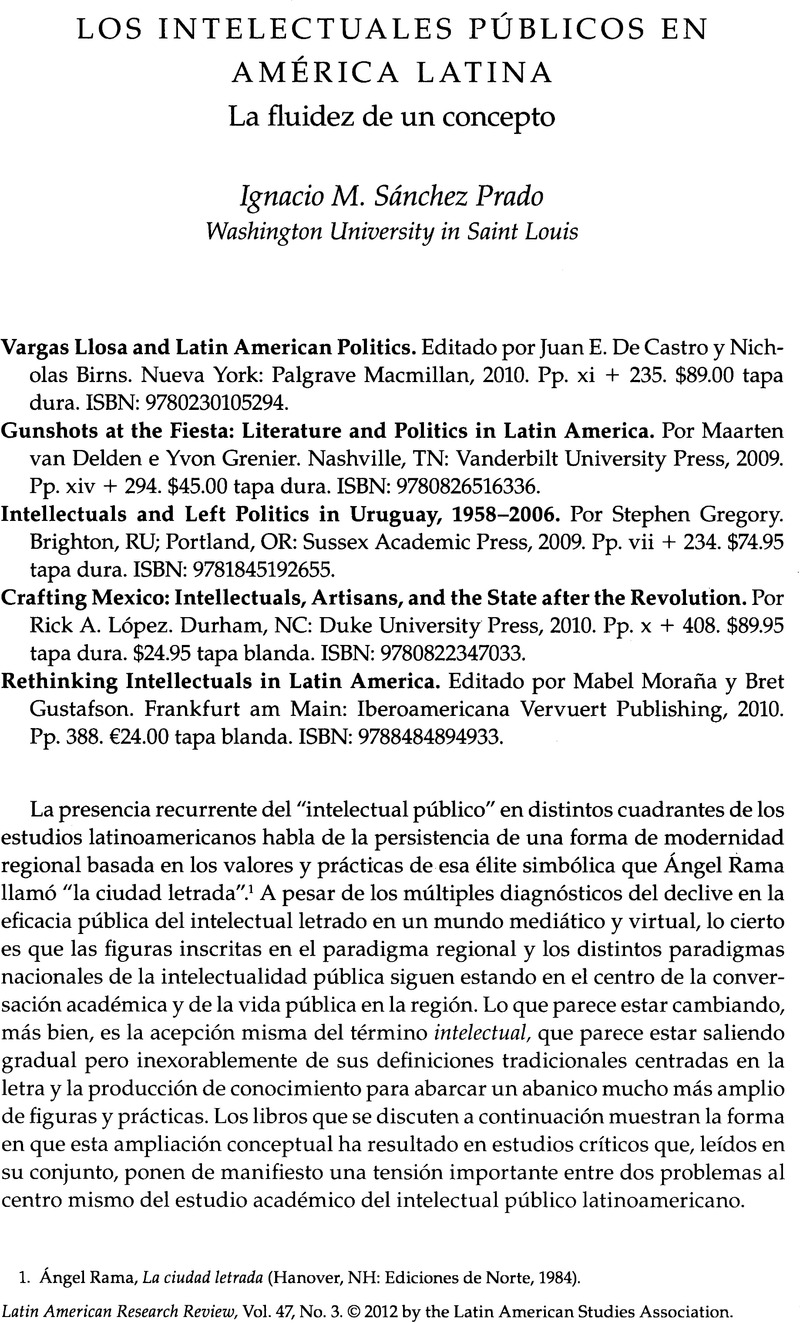Article contents
Los Intelectuales Públicos en América Latina: La fluidez de un concepto
Review products
Published online by Cambridge University Press: 05 September 2022
Abstract

- Type
- Review Essays
- Information
- Copyright
- Copyright © 2012 by the Latin American Studies Association
References
1. Ángel Rama, La ciudad letrada (Hanover, NH: Ediciones de Norte, 1984).
2. Charles Kurzman y Lynn Owens, “The Sociology of Intellectuals,” Annual Review of Sociology 28 (2002): 63-90.
3. Edward W. Said, Representations of the Intellectual: The 1993 Reith Lectures (Nueva York: Pantheon Books, 1994).
4. Roderic Ai Camp, Intellectuals and the State in Twentieth-Century Mexico (Austin: University of Texas Press, 1985); Nicola Miller, In the Shadow of the State: Intellectuals and the Quest for National Identity in Twentieth-Century Spanish America (Londres: Verso, 1999).
5. Véase Jorge Castañeda, La utopía desarmada: El futuro de la izquierda en América Latina (Buenos Aires: Ariel, 1993).
6. Véase en particular Gustavo de Armas y Adolfo Garcé, Uruguay y su conciencia crítica: Intelectuales y política en el siglo XX (Montevideo: Trilce, 1997).
7. Mabel Moraña, Memorias de la generación fantasma (Montevideo: Monte Sexto, 1988), 17-72 y 85-106.
8. Véase Charles Hale, Emilio Rabasa and the Survival of Porfirian Liberalism (Stanford, CA: Stanford University Press, 2008); Ignacio M. Sánchez Prado, Naciones intelectuales: Las fundaciones de la modernidad literaria mexicana (1917-1959) (West Lafayette, IN: Purdue University Press, 2009); Gareth Williams, The Mexican Exception: Sovereignty, Police, and Democracy (Nueva York: Palgrave Macmillan, 2011); Joshua Lund, The Mestizo State: Reading Race in Modern Mexico (Minneapolis: University of Minnesota Press, 2012).
9. Los tres libros más notables en estos términos fueron Gilbert Joseph y Daniel Nugent, eds., Everyday Forms of State Formation (Durham, NC: Duke University Press, 1994); Gilbert Joseph, Anne Rubenstein y Eric Zolov, eds., Fragments of a Global Age: The Politics of Culture in Mexico Since 1940 (Durham, NC: Duke University Press, 2001); Mary Kay Vaughan y Stephen Lewis, eds., The Eagle and the Virgin: Nation and Cultural Revolution in Mexico, 1920-1940 (Durham, NC: Duke University Press, 2006).
10. Es importante especificar que los capítulos no están coescritos, sino que cada uno de ellos es de un solo autor. Para aclarar posturas, en mis referencias a los capítulos indicaré quién escribió la sección en cuestión.
11. Véase Yvon Grenier, From Art to Politics: Octavio Paz and the Pursuit of Freedom (Lanham, MD: Rowman and Littlefield, 2001); Maarten van Delden, Carlos Fuentes, Mexico and Modernity (Nashville, TN: Vanderbilt University Press, 1998).
12. Juan E. De Castro, Mario Vargas Llosa: Public Intellectual in Neoliberal Latin America (Tucson: University of Arizona Press, 2011).
13. Efraín Kristal y John King, eds., The Cambridge Companion to Mario Vargas Llosa (Cambridge: Cambridge University Press, 2012).
- 1
- Cited by




